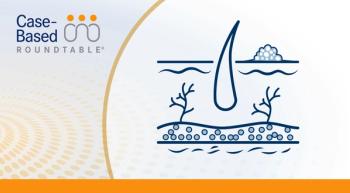
Key Risk Factors Affect Physicians’ Choice of Treatment in Melanoma
During a Targeted Oncology™ Case-Based Roundtable™ event, Evan J. Lipson, MD, and participants discussed when they would use monotherapy or doublet therapy in metastatic melanoma.
DISCUSSION QUESTION
- What is your experience with nivolumab plus relatlimab (Opdualag) for metastatic melanoma? What are your perceptions about this regimen?
EVAN J. LIPSON, MD: In the National Comprehensive Cancer Network guidelines, nivolumab [Opdivo] plus ipilimumab [Yervoy], nivolumab plus relatlimab, pembrolizumab [Keytruda], and nivolumab are all category 1.1 Pembrolizumab plus low-dose ipilimumab is a category 2b, although we do occasionally use that in the appropriate patient where you’re concerned about adverse events but they need the ipilimumab coverage. There is a revision in the footnotes talking about this issue of the increased toxicity in patients when you’re adding ipilimumab.
Have you had the opportunity yet to administer relatlimab/nivolumab in clinic as part of a trial or off the trial?
GARY TIAN, MD: I used off the trial when it was approved. I only used once so far. The patient was on adjuvant…pembrolizumab, with stage II melanoma. She progressed while she was on adjuvant PD-1 [therapy]…she’s 70 years old. I put her on combination [nivolumab/relatlimab]. Unfortunately, she quickly progressed. She tolerated it well, but within 2 or 3 months she died. It’s a sad situation, even stage II, but she didn’t respond to immunotherapy in the adjuvant setting. I put her on the combination with nivolumab/relatlimab and she still progressed and died. That’s my limited experience.
LIPSON: So you used it in the second-line, essentially. The patient had already had anti-PD-1 monotherapy, you gave her nivolumab/relatlimab, and there’s approximately a 9% to 12% response rate in the second line, so the odds were not in her favor, unfortunately.2 I’m sorry to hear about that outcome.
MICHAEL HEMPHILL, MD: I have heard of it but I haven’t given [nivolumab and] relatlimab yet.
LIPSON: Do you have any perceptions of the regimen, either based on any of the publications, presentations, or anything you’ve read?
HEMPHILL: Not yet.
RYAN CARR, MD: I have not had the opportunity to give it yet.
LIPSON: Any perception based on what you’ve read?
CARR: [My perception is] that it may be a bit more efficacious [than] monotherapy but less toxic than the [nivolumab/ipilimumab] doublet. Is it one of those things where you’re stuck in between? Is it better just to give the [nivolumab/ipilimumab] doublet? I guess we’ll find out, but those are my thoughts.
JIGAR SHAH, MD: I haven’t had a chance to use it.
LESTER PORTER, MD: My only time to use it was on a clinical study and it started about 2 years ago. I heard that the patient is now 2 years in complete remission with the melanoma with 1 metastasis and is now off of therapy.
LIPSON: That’s good to hear. How old was the patient, approximately?
PORTER: They were 65 years old.
LIPSON: When you’re thinking about frontline regimens for these patients with unresectable, metastatic, BRAF wild-type disease, how are you making decisions about whether to use pembrolizumab or nivolumab versus how to use nivolumab/ipilimumab or nivolumab/relatlimab?
WEI LIN, MD: If the patient had reasonable ECOG performance status but large disease burden and visceral involvement, I would typically recommend the doublet nivolumab/ipilimumab unless there’s a contraindication or some concern about adverse events. If the patient is very frail and also [has] questionable autoimmune disorder but is on a steroid, I might consider single agent. I don’t believe single-agent pembrolizumab or nivolumab alone is as effective as nivolumab/ipilimumab combination. Often, when we see these metastatic patients, we only have a 1-time chance. Disease can progress quickly.
LIPSON: Yeah, that ‘1 shot’ phenomenon is the most challenging where you feel like you have to hit it the first time; you don’t want to turn the heat up so high that they suffer a bad toxicity, but you don’t want to go so gently that you haven’t given them the benefit of the dual [therapies].
VICTOR GIAN, MD: [For] patients who have bad visceral metastatic disease and certainly symptomatic patients, I absolutely would use combination immunotherapy. I’ve had some terrible toxicities related to nivolumab/ipilimumab.
SCOTT HAAKE, MD: I always worry about my ability to salvage in the second-line setting. So, if the patient has a reasonable performance status, I like to use the doublet therapies.
CARR: My only rule is [using] doublet [nivolumab/ipilimumab] for brain metastases. Otherwise, it just depends on the patient. If somebody has low volume disease, lung-only [metastasis], and normal lactate dehydrogenase, I’m almost certainly going to give monotherapy unless they’re very young and motivated to get dual immunotherapy. If they’re 85 years old, then I may be more inclined to do single-agent monotherapy. But my only hard and fast rule is regarding brain metastases. It’s the doublet [nivolumab/ipilimumab]. Everything else is case-by-case basis.
Lipson: Yes, [I agree about] brain metastases. I can count on 1 hand the number of patients who have brain metastases and don’t end up getting dual therapy. Those are usually frail patients where instead, I’m using a single agent plus stereotactic radiosurgery because I think there’s no way they’ll handle bad toxicity. That’s the exception to the rule.
References:
1. NCCN. Clinical practice guidelines in oncology. Cutaneous melanoma, version 2.2023. Accessed June 7, 2023. https://bit.ly/2UK2FST
2. Ascierto PA, Lipson EJ, Dummer R, et al. Nivolumab and relatlimab in patients with advanced melanoma that had progressed on anti-programmed death-1/programmed death ligand 1 therapy: results from the phase I/IIa RELATIVITY-020 trial. J Clin Oncol. 2023;41(15):2724-2735. doi:10.1200/JCO.22.02072


















